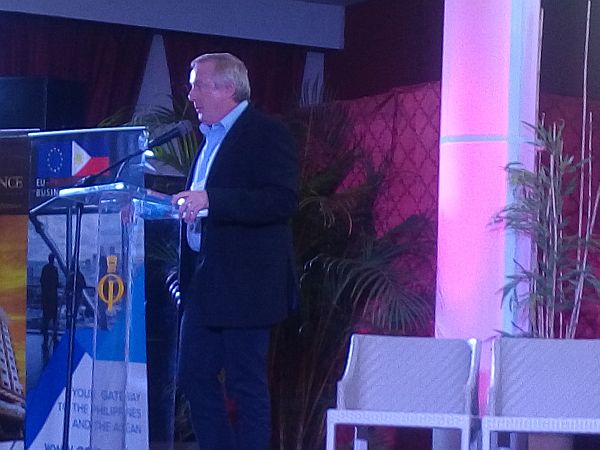ECCP sees shift in Cebu’s ‘creative’ sector

ECCP President Guenter Taus welcomes participants to the Doing Business with Europe networking activity at the Golden Prince Hotel & Suites in Cebu City on Tuesday, September 19, 2017.
CDN PHOTO Victor Anthony V. Silva
CEBU’S creative sector has enjoyed the patronage of many foreign markets for many years, with the highlight having been on world-class handmade furniture and accessories by local artists.
However, in the advent of technology, many are seeing a shift in platforms for Cebuano creativity-— from traditional ventures to digital enterprises.
“Filipinos, Cebuanos especially, are very creative. We all know the creativity when it comes to furniture and accessories, but I think we can also use that potential to develop other sectors,” Florian Gottein, European Chamber of Commerce of the Philippines (ECCP) executive director, said during a business networking meeting in Cebu City on Tuesday.
The “Doing Business with Europe: Opportunities for Visayas-based Companies” event was meant to explore opportunities for firms based in the Visayas and communicate European Union (EU) support to Cebuano-European businesses.
In the open forum, the ECCP was asked what its stand was on developing Cebu as a technology hub, and Gottein said they are keen on developing the innovation sector here as well.
“It is not just the call centers or business process outsourcing in general, but also knowledge process outsourcing, gaming, graphic design and animation,” Gottein said.
As a response to this shift, the ECCP has revamped its board in Cebu to open up to these technology-driven sectors.
Gottein said Cebu has a population largely comprised of young individuals open to technology and are fluent in English.
“A lot of the ingredients are there already. You just have to use them toward that direction,” he added.
ECCP President Guenter Taus, for his part, said Cebu already has a fairly decent technology base, with many young entrepreneurs coming up with solutions to different problems through app development.
“We used to look at Cebu’s artistic skills level in a traditional way — using hands to create fabrics and furniture. But we realized there has been a shift to modern media to express yourself,” he said.
ECCP has 800 members all over the Philippines, at least 125 of which are based in Cebu.
The business organization has been present in the province for 26 years, making its Cebu branch one of the oldest.
Traditional ventures
While the ECCP is slowly making the shift from traditional to digital in terms of the way they look at doing business here, the group’s thrust is still in improving business for more traditional ventures.
The ECCP and EU Ambassador to the Philippines Franz Jessen on Tuesday made courtesy calls to Cebu City Mayor Tomas Osmeña and Cebu Gov. Hilario Davide III, where they discussed possible areas of partnership.
Jessen said both local governments are looking for more European investments.
The EU is the Philippines’ second-largest export market only after Japan and is the country’s fourth-largest import partner.
“We are among the Philippines’ fastest growing export markets mainly due to the generalized system of preferences (GSP+), which gives Philippine exports a competitive advantage compared to other countries in the region,” Jessen said.
Under the GSP+ program, the Philippines can export over 6,200 product lines to the EU with zero tariff.
In 2016, bilateral trade between the Philippines and the 28-member bloc reached 12.8 billion.
As of the first quarter of 2017, the EU emerged as the largest foreign direct investor in the country with investments amounting to P10.3 billion, 50
percent of which was poured into the manufacturing industry.
Jessen said talks are already underway for a free trade agreement between the EU and the Philippines, a move seen to further improve trade relations of the two economies.
Walter van Hattum, economic and trade section head of the EU delegation, said he sees trade relations between the Philippines and Europe to remain strong.
He added that among Philippine export items, he sees huge potential in pineapple products, bicycles, fish fillet, footwear, tuna, sardines, pineapple juice, and fruit jams or jellies.
Van Hattum said he expects further growth in electrical machinery and equipment, mechanical appliances, animal or vegetable fats and oils, furniture and edible fruits and nuts, among others.
Disclaimer: The comments uploaded on this site do not necessarily represent or reflect the views of management and owner of Cebudailynews. We reserve the right to exclude comments that we deem to be inconsistent with our editorial standards.
